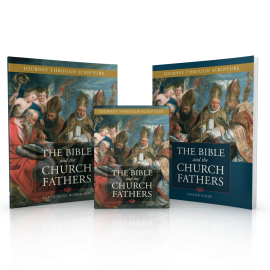By John Bergsma
Dr. John Bergsma is Professor of Theology at the Franciscan University of Steubenville. A former Protestant pastor, he is the author of several books on Scripture and the Catholic faith.
When I think about Lent, I think of the first two readings we use on the First Sunday and the Second Sunday of Lent.
The first reading of course is the account of Our Lord being tempted in the desert for forty days. Lent is a sort of sacramental sharing in Our Lord's suffering in the desert in His trials by the evil one. He was deprived of physical comfort and forced repeatedly to say no to the temptation to sin. That's one dimension of Lent.
But then the Second Sunday of Lent introduces a different dimension that I think is very interesting--that is the account of the Transfiguration. Now in the first three Gospels, the event of the Transfiguration marks the point in Our Lord's earthly ministry when He turns His face toward Jerusalem. He begins to journey toward Jerusalem, which is another way of saying journeying toward His death.
Lent is also that--it's also a participation in Jesus' death march to Jerusalem, where He is going to initiate the New Passover and die, and of course be risen again.
So Lent is our death march as well. The mortifications that we choose, the acts of self-denial that we pick for ourselves, should be a little bit painful, as Pope Francis reminds us. It should feel like dying a little death, one that can be joined to Christ's big death for the salvation of souls.
That's a little bit of what Lent means to me: temptation, transfiguration, and joining with Jesus in those two journeys.
You Might Also Like
The Bible and the Church Fathers is the fourth study in the Journey Through Scripture series. In twelve beautifully produced lessons, you will learn who the early Church Fathers were and how they shaped the way we read Scripture. You’ll discover the Church’s favorite tools for reading it, and you’ll understand Scripture’s relationship to Tradition and, in particular, to the Sacraments.
What’s more, you’ll recognize the powerful effect of Scripture on the Church Fathers. For them, this was no academic pursuit. Their love of God’s Word transformed their lives—just as it has the power to transform ours today.


